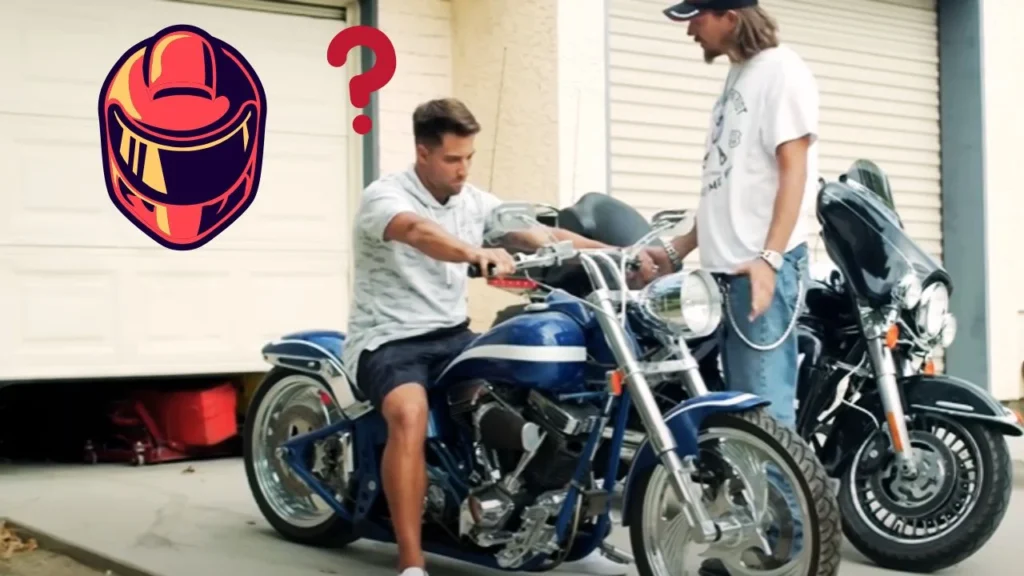Does Tennessee have a helmet law for motorcycles? Yes, Tennessee has a helmet law for motorcycles.
Tennessee enforces a universal helmet law, meaning all motorcyclists and passengers, regardless of age, must wear a helmet that meets safety standards.
When I first started riding in Tennessee, understanding this law was a top priority for staying safe and avoiding fines.
In this post, I’ll break down the details of Tennessee’s helmet law, offer some tips on choosing the right helmet, and highlight some of the best helmet options available.
Quick Fix
Yes, Tennessee enforces a universal helmet law for motorcycles, meaning all riders and passengers, regardless of age or experience, must wear a DOT-approved helmet. This law plays a crucial role in reducing motorcycle-related injuries and fatalities.
If you’re caught riding without a helmet, you could face a fine of up to $50. More importantly, wearing a helmet reduces the risk of death by 37% and lowers the chance of head injury by 69%, making it a vital piece of gear for any rider on Tennessee roads.
What is Tennessee’s Motorcycle Helmet Law?
Tennessee’s motorcycle helmet law requires that all riders and passengers wear helmets. This law has been in place to help reduce motorcycle-related injuries and fatalities. Here are the main points of the law:

- Universal Requirement: Everyone riding a motorcycle in Tennessee must wear a helmet, no matter their age or experience level.
- DOT Safety Standards: The helmet must meet the DOT (Department of Transportation) standards. This ensures that the helmet offers adequate protection in the event of an accident.
- Penalties for Non-Compliance: If you’re caught without a helmet, you could face a fine of up to $50. Beyond the fine, not wearing a helmet increases the risk of serious injury in case of an accident.
According to research, wearing a helmet reduces the risk of death by 37% and lowers the chance of head injury by 69%. Tennessee’s strict law plays a crucial role in improving rider safety.
Why Tennessee Enforces the Helmet Law
Tennessee’s helmet law is designed to protect riders from severe injuries and fatalities. The risks of riding without a helmet are significant. Helmets are not just a legal requirement but a proven safety measure.

Here are some reasons why the helmet law is in place:
- Increased safety: Head injuries are common in motorcycle accidents. Helmets significantly reduce the severity of these injuries.
- Lower medical costs: Riders without helmets are more likely to suffer expensive medical treatments after accidents.
- Public health: Fewer injuries reduce the burden on hospitals and emergency services.
Purpose of Tennessee’s Helmet Law
Tennessee’s motorcycle helmet law has evolved over the years to prioritize safety. Initially established as a recommendation, it eventually became a law due to mounting evidence that helmets significantly reduce injury severity and fatality rates.
Over time, Tennessee’s Department of Safety worked closely with the Motorcycle Safety Foundation (MSF) to establish standards and implement DOT-approved requirements for helmets. This law not only safeguards riders but also reduces the strain on Tennessee’s healthcare system by preventing severe injuries.
The statistics on helmet use speak volumes about its importance. According to the Insurance Institute for Highway Safety (IIHS), helmets are 67% effective at preventing head injuries, and states with universal helmet laws report about 20% fewer fatalities than those without.
Tennessee’s enforcement of this law has contributed to lower motorcycle accident death rates compared to states without helmet mandates. In fact, data from the CDC estimates that helmet laws save states approximately $725 per registered motorcycle each year in healthcare costs, highlighting both economic and safety benefits.
Are There Age Requirements for Helmet Use?
Tennessee’s universal helmet law applies to all riders regardless of age. However, it’s important to note that the law is especially important for younger, less experienced riders.
Studies show that riders under the age of 21 are at a higher risk of accidents and injuries, making helmet use critical for their safety.
Exceptions to the Helmet Law
While Tennessee’s helmet law is pretty strict, there are a few exceptions. For example, riders in parades or those riding on private property may not be required to wear a helmet. However, these exceptions are rare, and it’s generally safer to wear a helmet at all times.
Here’s a quick list of the exceptions:
- Riders on private land.
- Parade participants riding at low speeds.
- Some motorcycle operators with medical conditions that prevent them from wearing a helmet. (You will need special permission for this.)
If you’re ever in doubt, it’s always a good idea to wear your helmet. After all, safety should be your top priority.
What Happens If You Don’t Wear a Helmet?
Riding without a helmet in Tennessee isn’t just dangerous; it’s also illegal. If you’re caught riding without a helmet, you could face penalties, including fines.

Here’s what you need to know about the consequences:
- First offense: A fine of $50.
- Repeat offenses can lead to higher fines or points added to your driver’s license.
While the fines may seem minor, the cost of an injury resulting from riding without a helmet can be astronomical. In fact, studies show that hospital expenses for unhelmeted riders are nearly twice as high as those for riders wearing helmets.
How Wearing a Helmet Saves Lives
Studies show that wearing a helmet saves lives. According to the CDC, helmets are estimated to save the lives of over 1,800 motorcyclists annually.
In states like Tennessee, where helmet laws are enforced, the number of fatalities and severe injuries from motorcycle crashes is lower.

Riding without a helmet may feel freeing, but it significantly increases your risk of serious injury or death.
Here are a few more statistics that show the importance of wearing a helmet:
- Riders without helmets are three times more likely to suffer brain injuries.
- In 2020, over 75% of fatal motorcycle accidents involved riders who were not wearing helmets.
Key Statistics and Facts About Helmet Use
- Wearing a helmet reduces the risk of death by 42%.
- Helmets lower the chance of serious head injury by 69%.
- The state of Tennessee averages over 5,000 motorcycle crashes annually, with a significant portion involving riders without helmets.
- Hospital costs for unhelmeted riders are double compared to those who wear helmets.
Tennessee’s Licensing and Safety Course Requirements
In Tennessee, obtaining a Class M license is mandatory for motorcycle operation. The Motorcycle Rider Education Program (MREP), managed by the Tennessee Department of Safety, offers courses to help new riders learn the basics and build confidence. Riders over 21 who complete an MREP-approved course may be permitted to wear partial helmets, although full helmets are recommended for comprehensive safety. MREP courses also cover state-specific helmet requirements, making them a valuable resource for Tennessee riders.
Economic Benefits of Helmet Laws for Tennessee
Helmet laws don’t just save lives; they also have significant economic advantages. Studies show that helmet use saves Tennessee millions in healthcare costs by reducing the severity of injuries. For individual riders, wearing a helmet reduces potential medical expenses from injuries. Considering that non-helmeted riders often face higher long-term care costs due to more severe injuries, the initial investment in a quality helmet is minimal by comparison.
Additional Safety Gear Recommended for Motorcyclists
While helmets are required by law, other protective gear is also important for your safety. Wearing proper gear can further reduce your risk of injury. Here’s a list of recommended safety gear:
- Protective eyewear: Sunglasses or goggles are crucial for protecting your eyes from debris.
- Leather jackets and pants: These offer protection against abrasions in case of an accident.
- Gloves: They protect your hands from injury and improve your grip.
- Boots: Sturdy footwear can help prevent ankle and foot injuries.
How Tennessee Compares to Other States
Tennessee’s helmet law is considered a “universal helmet law,” meaning all riders must wear helmets regardless of age or experience. This differs from some states where only younger riders or new riders are required to wear helmets. For example:
- Florida: Only riders under 21 are required to wear a helmet.
- Texas: Riders over 21 with proper insurance can choose not to wear a helmet.
These differences highlight why it’s important to know the specific laws of each state before you ride. Tennessee’s strict stance on helmets has been proven effective, with the state seeing fewer fatalities compared to states with more relaxed laws.
Conclusion
Does Tennessee have a helmet law for motorcycles? Yes, Tennessee enforces a universal helmet law, requiring all riders and passengers to wear a DOT-approved helmet. Following this law is crucial for both your safety and legal compliance.
Whether you’re looking for a budget-friendly option like the Bell Qualifier or a high-end helmet like the Shoei RF-1400, you’ll find plenty of options that fit your needs.
Remember to choose the right size, consider your specific requirements like wearing glasses, and always prioritize safety. Stay safe and ride responsibly!
Learn complete guide on other motorcycle helmet laws like
is it legal to ride a motorcycle without a helmet
can i take motorcycle helmet on plane
can you ride a motorcycle without a helmet in Florida
FAQs
- Does Tennessee have a helmet law for motorcycles?
Yes, all riders and passengers must wear a helmet in Tennessee. - What is the fine for not wearing a helmet in Tennessee?
The fine can be up to $50. - Do helmets in Tennessee need to be DOT-approved?
Yes, helmets must meet DOT safety standards.





